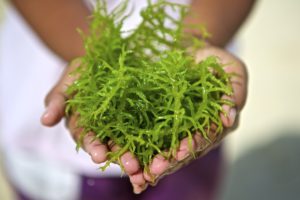Carrageenan is made from parts of various red algae or seaweeds and is used for medicine.
Contents
Uses
They are widely used in the food industry, for their gelling, thickening, and stabilizing properties. Their main application is in dairy and meat products, due to their strong binding to food proteins. There are three main varieties of carrageenan, which differ in their degree of sulphation. Kappa-carrageenan has one sulphate group per disaccharide. Iota-carrageenan has two sulphates per disaccharide. Lambda carrageenan has three sulphates per disaccharide.
Gelatinous extracts of the Chondrus crispus (Irish Moss) seaweed have been used as food additives since approximately the 15th century. Carrageenan is a vegetarian and vegan alternative to gelatin in some applications or may be used to replace gelatin in confectionery.
Benefits
Carrageenan is used for coughs, bronchitis, tuberculosis, and intestinal problems. The French use a form that has been changed by adding acid and high temperatures. This form is used to treat peptic ulcers, and as a bulk laxative.
Some people apply carrageenan directly to the skin for discomfort around the anus.
In manufacturing, carrageenan is used as a binder, thickening agent, and as a stabilizer in medications, foods, and toothpaste. Carrageenan is also an ingredient in weight loss products.
Cautions
Carrageenan is LIKELY SAFE for most people when taken by mouth in food amounts. There is a chemically altered form of carrageenan that is available in France to treat peptic ulcers. This form is POSSIBLY UNSAFE because there’s some evidence that it might cause cancer.
Special Precautions & Warnings:
Pregnancy and breast-feeding: Carrageenan is LIKELY SAFE in amounts found in food, but there’s not enough information to know if it’s safe in the larger amounts that are used as medicine. It’s best to stay on the safe side and avoid use in medicinal amounts.
Bleeding disorders: Carrageenan might slow blood clotting and increase bleeding. In theory, carrageenan might make bleeding disorders worse.
Low blood pressure: Carrageenan might lower blood pressure. In theory, taking carrageenan might make blood pressure become too low in people with low blood pressure.
Surgery: Carrageenan might slow blood clotting and lower blood pressure in some people. In theory, carrageenan might increase the risk for bleeding and interfere with blood pressure control during surgical procedures. Stop using carrageenan at least 2 weeks before a scheduled surgery.
Interactions
- Medications for high blood pressure (Antihypertensive drugs) interacts with CARRAGEENAN
Carrageenan seems to decrease blood pressure. Taking carrageenan along with medications for high blood pressure might cause your blood pressure to go too low.
Some medications for high blood pressure include captopril (Capoten), enalapril (Vasotec), losartan (Cozaar), valsartan (Diovan), diltiazem (Cardizem), Amlodipine (Norvasc), hydrochlorothiazide (HydroDiuril), furosemide (Lasix), and many others. - Medications taken by mouth (Oral drugs) interacts with CARRAGEENAN
Carrageenan is a thick gel. Carrageenan can stick to medications in the stomach and intestines. Taking carrageenan at the same time as medications that you take by mouth can decrease how much medication your body absorbs, and decrease the effectiveness of your medication. To prevent this interaction, take carrageenan at least one hour after medications you take by mouth. - Medications that slow blood clotting (Anticoagulant / Antiplatelet drugs) interacts with CARRAGEENAN
Carrageenan might slow blood clotting. Taking carrageenan along with medications that also slow clotting might increase the chances of bruising and bleeding.
Some medications that slow blood clotting include aspirin, clopidogrel (Plavix), diclofenac (Voltaren, Cataflam, others), ibuprofen (Advil, Motrin, others), naproxen (Anaprox, Naprosyn, others), dalteparin (Fragmin), enoxaparin (Lovenox), heparin, warfarin (Coumadin), and others.
Other names
Algas, Algue Rouge Marine, Carrageen, Carrageenin, Carragenano, Carragenina, Carragheenan, Carraghénane, Carraghénine, Chondrus crispus, Chondrus Extract, Euchema species, Extrait de Mousse d’Irlande, Galgarine, Gigartina chamissoi, Gigartina mamillosa, Gigartina skottsbergii, Irish Moss Algae, Irish Moss Extract, Mousse d’Irlande, Red Marine Algae
References
Source: Wikipedia, https://en.wikipedia.org/wiki/Carrageenan#Food_and_other_domestic_uses


Soothes irritated skin such as Eczema, Psoriasis, Burns, Dry-Cracked Skin, Bug Bites, Sunburns, etc.The combination of natural and organic ingredients have beneficial properties for skin.
Helps to reduce the look of fine lines and wrinkles. Makes your skin feel softer and smoother. Hypo allergenic and safe. Doesn’t contain harmful chemicals. Good for all skin types, especially sensitive skin. Visit the website at http://deluviausa.com/product-category/deluvia-skin-care/
Click to View what Alicia W., Co-Founder of Delúvia Inc. has to say about how the company started and how its products could help others.
https://www.youtube.com/watch?v=ePrifdk1Wus